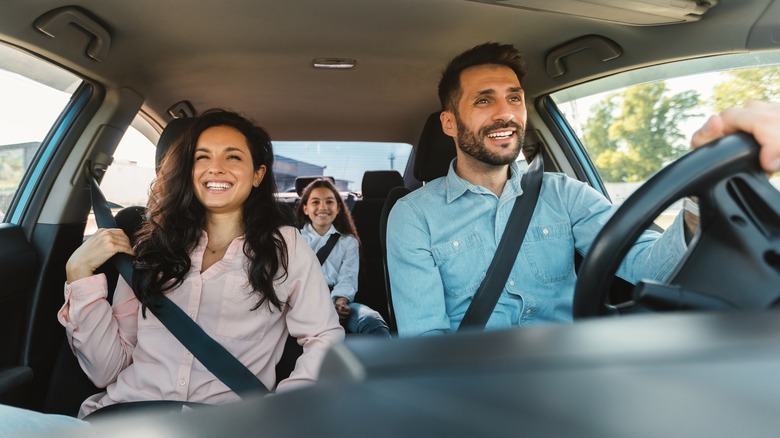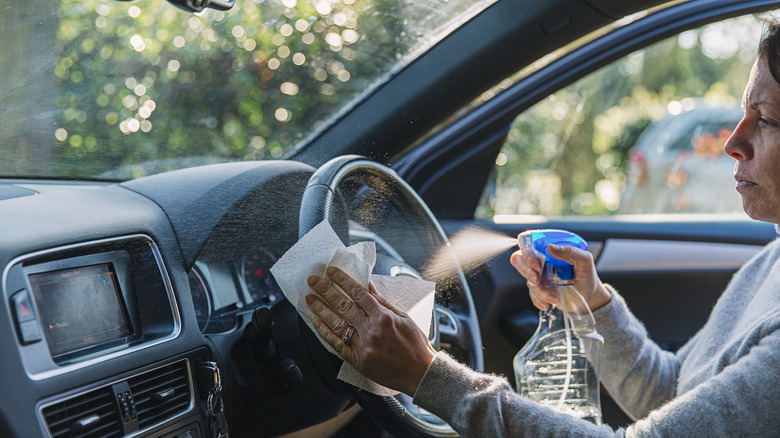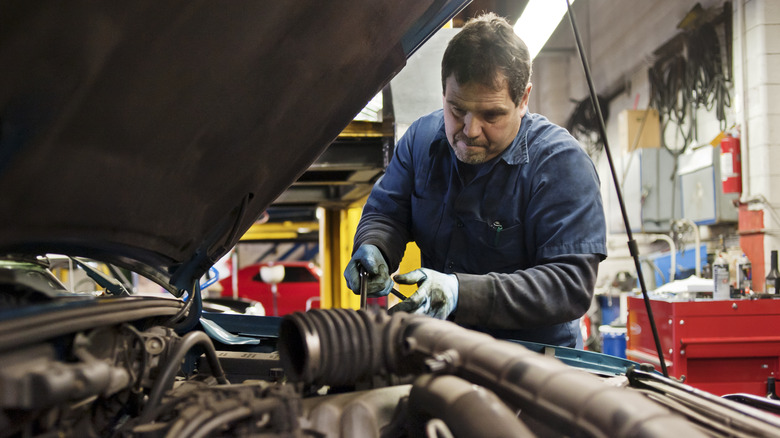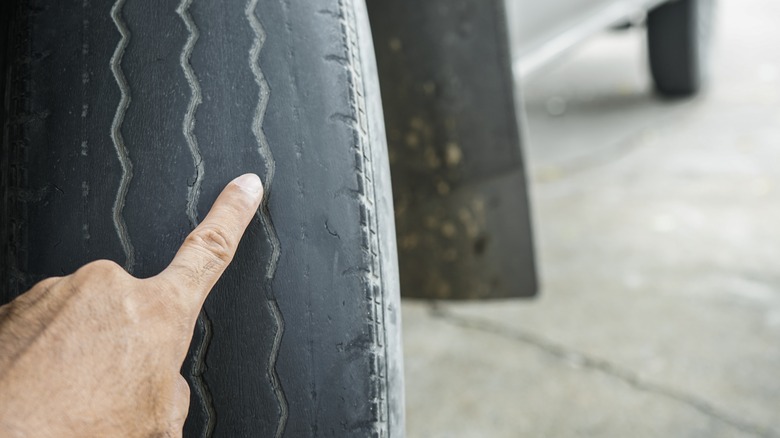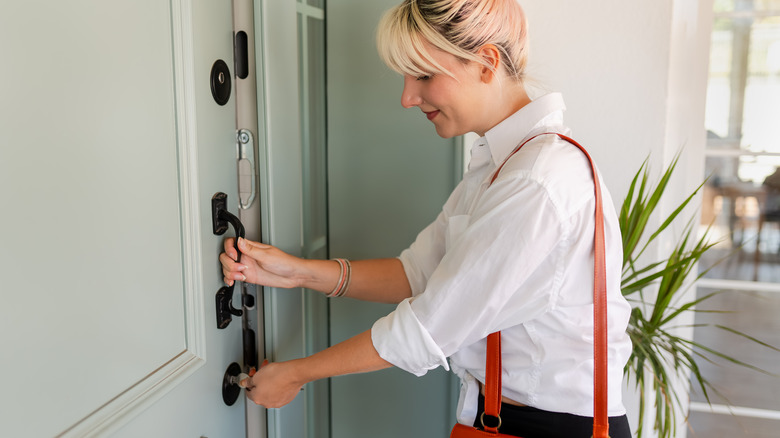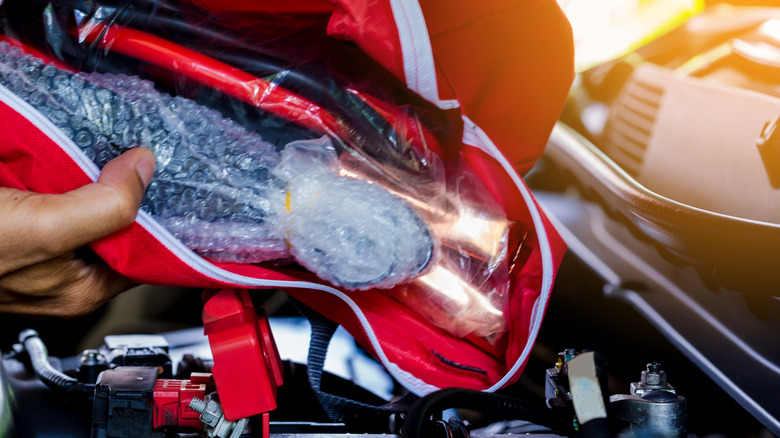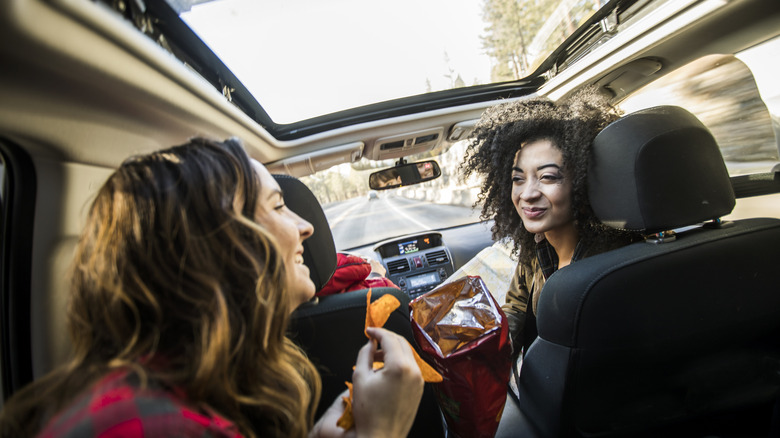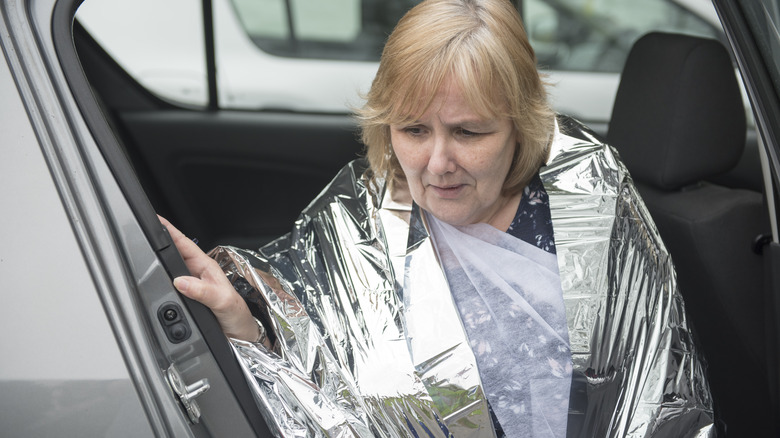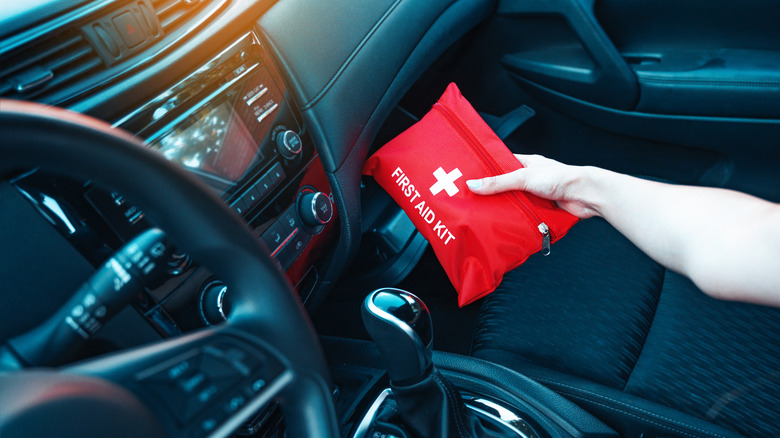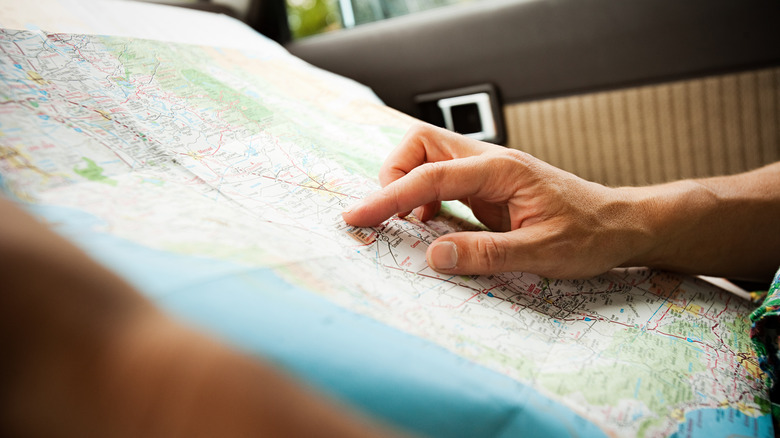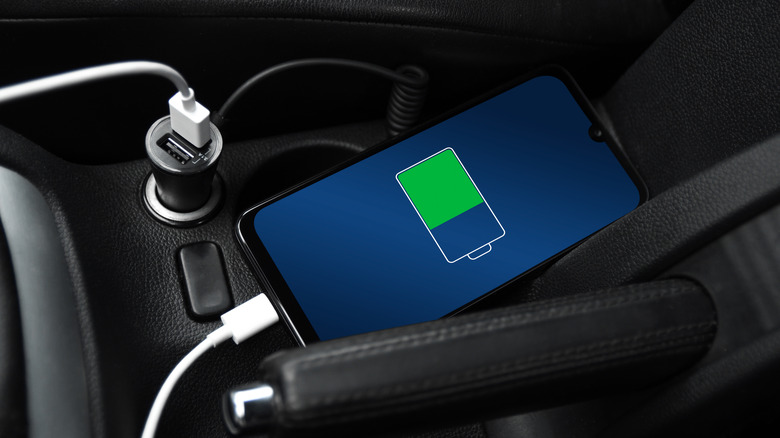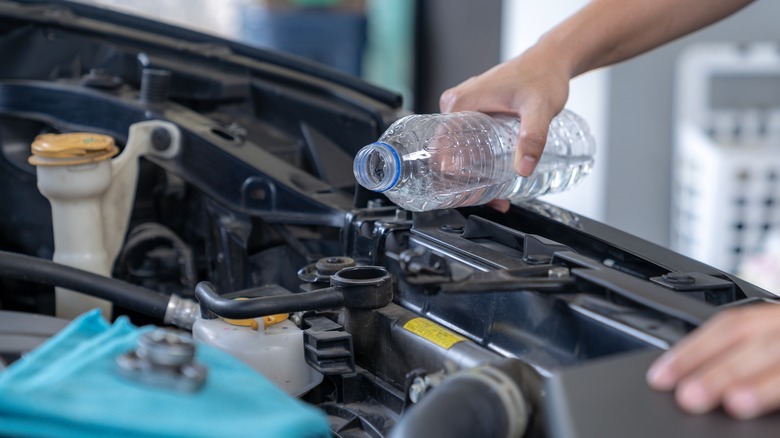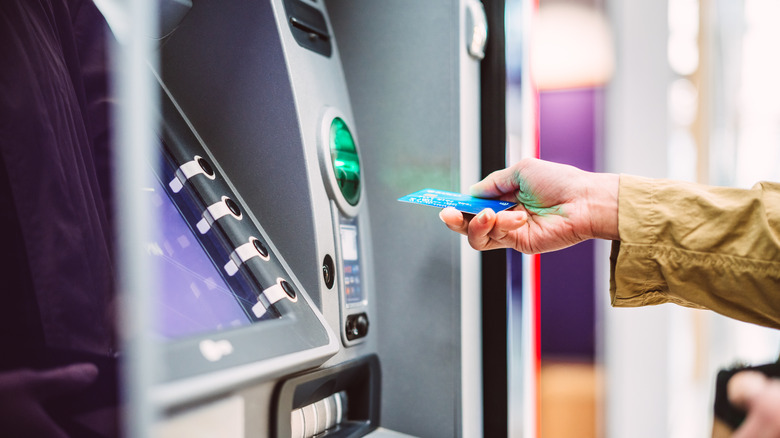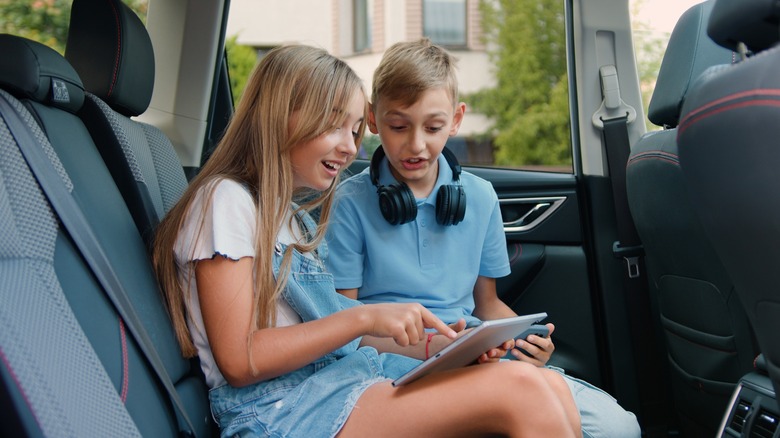Have A Stress-Free Road Trip With These Tips And Tricks
Imagine heading out on a whirlwind, bucket list cross country road trip without being prepared for it. Driving your car several thousand miles through different weather and terrain is no small feat. Nor is putting your body through that kind of travel. It is essential to be as prepared as possible for a road-trip, because it means you've done the advance work to make the trip as stress free as possible.
When it comes to road tripping, you don't want to just prepare your car for the journey with oil changes, tire rotations, and the like. You also want to make sure you have equipment in your car that is going to help keep you safe and alert. Things like snacks, extra blankets, first aid, and even entertainment are all going to keep your stress levels down, and your enjoyment and safety up.
As such, we've compiled a one-stop shop of 13 tips and tricks you need for a stress-free road trip. All of these need to be done before you even put the key in the ignition and set off. Trust us, neglecting even a single one of these tips could lead to more stress than you'd like to have.
Clean your vehicle inside and out
Everyone has their own level of cleanliness when it comes to their car. There are some who cannot fathom the idea of a single stray candy wrapper littering the floor. Others can pile up an immense amount of refuse before remotely considering cleaning their car. Wherever you fall on this cleanliness spectrum doesn't matter when it comes to a road trip, however. You should always give your car a thorough cleaning, inside and out, before you set off on your journey.
For one thing, your car will thank you for it. Removing layers of built up grime and dust from the exterior of your car is going to help make it shine, and even help maintain engine efficiency. Your car will drive better, and get better fuel economy, if it's been cleaned. However, where the cleaning does the most good is on the inside.
Not only does a clean car tend to feel better, putting you at more ease when you're on the road, but it also presents an opportunity for better storage and organization. Finding your map, chargers, snacks, and emergency kits are is going to be so much easier when you don't have to dig through debris to access them. So take the time early on to clean your car. You'll be glad you did.
Service your car for best performance
This one is an absolute must. Even if your car is only a few years old, getting it in the shop with a trusted mechanic before a long journey is a requirement for any responsible auto owner. Regardless of vehicle age, all cars need to undertake preventative maintenance in order to run properly. You don't want to find yourself at the mercy of that engine light you ignored when you're miles away from home.
In the weeks before your trip, schedule a day where your mechanic can give your car a full service. This includes maintenance essentials like oil and fluid changes, air filter swaps, tire rotation, brake checks, windshield wiper replacements, and any other necessary repairs that will make the car road worthy for a long distance trip.
While you should let your mechanic take care of the big stuff, there are some routine maintenance checks you can make at home. For example, lights are very easy to replace on a car, and doing checks on things like seat belts and air filters are also things owners can do easily. Once your car is ready to go, you should be all set to make your trip. However, if your car is really only in shape for local driving, it might be better to consider a rental.
Check or replace your tires
The tires are kind of like a car's feet, only with shoes. They do the grunt work of getting you where you want to go. And, like shoes, tires can get worn out after a lot of use. This is why it is important to check your tires before you head out on a long road trip.
You can check the tread for wear and tear by using a simple trick with a penny. Turn Abe Lincoln's head upside down and stick the penny in the ribs of the treads. If the top of Abe's head is hidden, your treads are good. If you can see the top of Abe's head, the tread is too low and it's time to replace your tires. You also want to check for areas where there might be leaks or punctures. You could easily have your mechanic do this. They might be able to get a better idea of potential damage when the car is lifted.
Even if your tires are in good shape for travel, you might want to consider swapping them out. This depends on where you're headed. If you're off to somewhere that is going to have more dirt than pavement, a set of all-terrain tires are going to suit you much better than the pair you use to commute to work. You can always get the tires swapped back when you get home.
Close up your house
Before leaving for a trip, it's good to go through your home and "close" it. Closing your home could mean a lot of things to different people. Much the same as everyone has their own sense of car cleanliness, so too do people have differing levels of home cleanliness. The process of closing your home gets you to the point where you can say "This is clean." It makes for a nice place to come home to after your trip.
Think of closing your house like preparing it for a rest. Your home works hard every day to keep you sheltered. Your trip comes as an opportunity to give it a well-earned break. Adjust your thermostat, and unplug appliances like computers, televisions, coffee pots, and phone chargers. No need to run up the electric bill when you aren't home. If you don't have pets or plants that need water, shut off your water and drain the taps. This will help prevent any potential leak or flooding while you're away.
If you do have pets or plants, it's a good idea to call on a trusted neighbor or friend to come over and water/feed your plants and animals while you're away. Their presence will also likely deter any nefarious folk who might be thinking of breaking into your home while you're away. Setting your outdoor motion lights and your alarm system is another way to scare off would-be burglars.
Have an emergency tool kit
As much as we hope to avoid them, especially on the road, the fact remains that emergencies happen. When they do, it is important to be prepared. Everyone who drives needs to have an emergency tool kit available in their car. You can purchase a prepackaged one online, or fabricate one based on your own needs. Regardless, it's important to know the essential emergency tools that are vital for getting you out of sticky situations.
An emergency car kit should always include flashlights, jumper cables, reflective warning triangles, a multitool, fire extinguisher, antifreeze, engine coolant, tire jack, spare tire, duct tape, bungee cords, cable ties, ponchos or umbrellas, and a combo window-hammer and seatbelt cutter. All of these essential emergency supplies cover situations you might face on a long road trip, such as flat tires, battery failure, broken car parts, and being stuck in your car.
While we can do as much as possible, driving wise, to make sure that we're safe, we can't control other drivers, the road conditions, or Mother Nature. This is why having an emergency kit is so important. It helps keep you safe when those emergency situations strike. This way, you can drive safely knowing that should the worst occur, you have the tools you need to make it through until help arrives.
Bring plenty of snacks
It might seem silly to say, but there is nothing that will sour a road trip more than a lack of snacks. Your favorite treats play a dual role in the success of your road trip. Firstly, they make you happy. Having some of your favorite snacks in hand is going to bring joy to your trip. Obviously, you want to balance your favorite guilty pleasure snacks with healthy ones, but the fact remains that some snacks on the road are going to do wonders for your mood.
Secondly, having snacks on hand helps keep your energy up while you're driving. Think of bringing snacks that are portable, but provide you with the best amount of energy. Think granola bars, jerky, fruit, chocolate bars, and anything that will get you some good protein. Avoid snacks that are too sugary, though we won't begrudge you the occasional cookie.
Naturally, you'll need to pair your snacks with something to drink. For this there is nothing better than water, but something with caffeine or electrolytes is also good to have in order to boost your attention. Don't let yourself become dehydrated while driving. Trust us, a few pit stops are worth it to stave off dehydration. But more on that in a bit.
Pack extra blankets and warm clothes
Extra blankets and clothing should be added to that emergency car kit we talked about earlier. However, we feel they are important enough to warrant their own explanation. You see, like snacks, blankets and clothes play a double role in your journey. Their primary purpose is to keep you and your passengers comfortable, especially if you are traveling with children. Whenever you're planning a trip, making sure the kids are comfortable is a top priority. There are few things worse on a road trip than a kid that won't sleep because you forgot to pack his favorite blanket.
Now, the second role that blankets and extra clothes have to play is during an emergency. Being stranded in the snow is no laughing matter. The more blankets and clothes you have to keep you warm, the better things are going to be for you until help arrives. It's vitally important to keep your internal body temperature up in cold situations. Clothing and blankets help trap that body heat, insulating you against the cold for longer than if you did not have them.
Blankets can also come in handy to build makeshift shelters in case you need them too. Using those cable ties you've got stored in your emergency kit, you can string up a blanket that will keep you moderately protected from the elements as you wait to be rescued.
Always pack first aid in case of emergency
It doesn't matter whether you're going to work or heading out on a cross country road trip, you should always have a first aid kit in your car. There is never an instance when you should be without it. While many of us are only ever going to use it to handle minor injuries, a well-stocked first aid kit can mean the difference between life and death in certain situations.
There are several essentials that should come in a first aid kit. Bandages, gauze dressing pads, bandage rolls, tweezers, finger bandages, scissors, an emergency blanket, disinfectant, cold compress, antiseptic wipes, gloves, and single-use thermometers are all items you can find in a good first aid kit. There are many companies, such as the American Red Cross, that sell kits with the items just mentioned.
It's important to make sure that the kit you buy is within easy access. Purchase one that will easily fit under the passengers seat or in the glove compartment. Avoid keeping them in the trunk, because you might not be able to access that fast enough.
Always have a map for backup
We know that the first thing people do before heading off anywhere is to plug their destination into a smartphone or GPS. While the global positioning systems we all now have available in our pockets are absolutely amazing, they are not always reliable. Even if you're not venturing out into the rural reaches of the country, you may end up in an area with no service. It is times like these when you need a map by your side.
Learning how to read a map is essential for anyone planning to take a road trip. Fortunately, road maps are one of the easiest maps to read, even for beginners. They provide a complete layout of an area, and easy legends that help you pinpoint exactly where you are. Having a road map of the areas you plan on visiting will come in handy in the event that your phone or GPS has no service, or the battery dies.
Maps are accurate and never lose battery or signal. When you find yourself in need of one, you have two options. Either pull over to gather your bearings or continue driving and have your copilot navigate. Never attempt to read a map and drive simultaneously.
Have the right cables and chargers
Making sure you have the right kinds of chargers and cables is going to mean a world of difference when it comes to powering your devices, and potentially even your vehicle. Portable jump starter/battery charger combos are easy to find at any auto parts or hardware store. Depending on the amperage, they could do the job of starting your car and marginally charging your battery.
Other things you'll want to bring along are aux and USB cables so you can play music from your phone on your car radio, camera chargers so you'll be able to take plenty of pictures, and, of course, your phone charger to keep that vital rectangle alive and kicking.
When you're getting ready to leave, set aside a separate bag specifically for these chargers. This puts them all in one place so you won't have to worry about tracking them down at the last minute.
Water can be for more than just hydration
Remember earlier how we said it's important to stay hydrated while traveling? We weren't kidding about that. Dehydration can very easily cause fatigue, headaches, dizziness, lightheadedness, and intense thirst. None of these are things you want happening while you drive. You need to be alert on the road. Hydration is a key part of that puzzle.
However, water can play a larger role in your road trip than just keeping dehydration at bay. Water can actually be used as a means of servicing your car. Your car's radiator contains a reservoir that is filled with specialized coolant. This helps keep the engine from overheating and running smoothly. In the event that your engine overheats, or your coolant levels become low, you can use water as a substitute for cooling the engine.
This is not recommended for long term use, but in an emergency water can be used to keep your engine from overheating. Keep several large jugs of water in the trunk of your car in case this ever needs to happen. Odds are it won't if you're driving sensibly and your radiator isn't leaking. But, in case of an emergency, water is a good thing to have on hand for quick engine cooling.
Let your bank know where you're going
Imagine rolling into your destination, heading up to the clerk at the hotel, going to pay the balance of your stay, and your card gets declined. You check and there is plenty of money in your account. So what gives? Suddenly, your bank alerts you to potential fraud happening in your area. Unfortunately for you, it's far too late to remedy the situation. You sigh and regret not telling your bank that you were traveling.
A lot depends on the type of bank you have, but most will flag transactions made in areas that you are not normally present in. Say you live in New Hampshire and are all of a sudden buying gas and dinner in Ohio. That could alert your bank to potential fraudulent activity, since you don't usually purchase gas and dinner in Ohio.
This can easily be solved by letting your bank in on your travel plans. Bank tellers will be able to leave travel notes on your account. That way should a transaction pop up outside of your normal purchasing, you won't have to worry about your accounts being temporarily frozen.
Pack plenty of entertainment
The final key to a stress-free road trip is to pack plenty of entertainment. Keeping entertained is actually much more important than you might think. Whether it's having another person to talk to, music to blast, or an audiobook to listen to, entertainment engages you enough to keep you alert while driving. Keeping up an exhilarating conversation with a fellow passenger is a great way to make sure you're not falling asleep at the wheel during an evening's drive.
Entertainment can also be a godsend if you are traveling with kids. While they are certainly going to sleep for a portion of your trip, they're going to get bored eventually. When that happens, having an audiobook, music, or a movie on hand is going to keep them from staging an all out mutiny. Keep the kids entertained and the goings are going to be so much smoother.
Take all of these tips and tricks into account, and apply them to your next road-trip plans. When you're on the road and relaxed, you'll be happy you took our advice.
